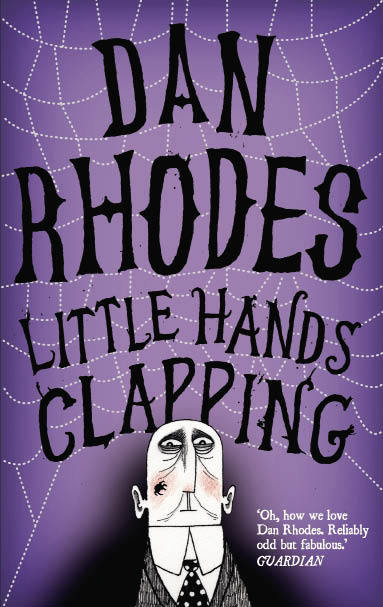When I was about half way through Little Hands Clapping, Dan Rhodes’s fifth published book, I started a list of the innocent characters on whom fate and their author play nasty tricks.
When I was about half way through Little Hands Clapping, Dan Rhodes’s fifth published book, I started a list of the innocent characters on whom fate and their author play nasty tricks. I thought of the decent doctor who marries a woman so beautiful and yet so unfaithful that it ruins his life; the two good-looking children who have eyes only for one another, until they discover that he is in fact the most beautiful man in the world and she looks quite ordinary; and the young man with a passion for opera whose rich, older wife transforms him into a Pavarotti lookalike.
Little Hands Clapping is being marketed as a ‘black comedy’. There are moments when the blackness risks smothering the comedy, but for the most part it is funny and quite horrible in equal parts. However, my list of the book’s doomed innocents was spoiled for the same reason as the novel is a remarkable success. Just when all seems quite hopeless and Rhodes appears to be willing to sacrifice even his most sympathetic characters to their naughtiest impulses, he goes soft. An unapologetic small-town love story replaces the gothic riffs on death and sex. This is bound to annoy those who hail Rhodes as a successor to Roald Dahl, but it is brave of him to attempt to engage with a fuller spectrum of emotions. It moves this book from being a finely written schoolboy fantasy into the realm of the grown-up novel.
In the middle of Germany, a museum of suicide acts as a magnet for those wanting to do themselves in. Rather than dissuading them, as its well-meaning proprietor hopes, it provides ideas, role models and even means. It is overseen by an old and compassionless man, whose only pleasure in life is an occasional chocolate cake. What happens to the dead bodies becomes the novel’s central storyline and takes in everything you might fear (cannibalism and necrophilia) and then some other incidents, which require an imagination as peculiar as Rhodes’s to dream up.
This may all seem very cultish, but technically the novel is traditional. Having introduced his theme, Rhodes presents a sympathetic character determined to kill herself. In a rather cinematic structure, he then interweaves her journey towards the museum, with a police investigation which would lead to her being saved. The question is which will conclude first. This being Dan Rhodes, the police investigation is undertaken by the small town’s least dynamic officer, who breaks to wander home and clean his rabbit cage. The policeman, Horst, is one of the novel’s most brilliant creations: having decided he’s going to model himself on a rebellious movie cop, he knows he needs a memorable personality trait and comes up with muttering Latin expressions. His problem is that his Latin is rusty: ‘At the earliest opportunity he would go to the loft and find his old schoolbook.’
This plot drives the narrative, but the best parts of the book tend to be incidental to it. There is a description of a desperately mediocre exhibition of paintings in an airport terminal, which satirises how bad such attempts at municipal art often are. In this case, all the big national galleries lend works, but each chooses their least important. A passing old drunk pathetically slurs a lullaby from his youth, which turns out to be so gory it must have accounted for terrible nightmares. And there is a devout cleaning lady who once blasphemed and is convinced she is therefore destined for hell. She meets a kindly old man who does much to cheer her up and then, having confided that he will inevitably suffer the same fate, dies. The description of his biscuit-fuelled wake — wholly devoid of any hope — is very funny.
Black humour aside, Rhodes is an accomplished prose stylist. Hackneyed concepts, such as the meeting of eyes on an underground train, are not merely subverted by the hopelessness of their characters, but moving for the delicacy with which they are described. This matters: Rhodes understands that there is an important step often missed by young writers. Before you can turn clichés into postmodern humour, you ought to master them.
The success of this novel may not surprise people who saw Rhodes on Granta magazine’s list of the 20 best young British novelists in 2003. I was not, however, a fan of his first book, Anthropology, a collection of 101 fairly bitter observations on relationships, which seem self-satisfied and not particularly insightful. Timoleon Vieta Come Home (2003) proved him a successful novelist. It is with Little Hands Clapping, however, that he seems to have fulfilled his potential. This book will not appeal only to his numerous current fans, but to pretty much anyone who can stomach a bit of gruesome vulgarity in a love story. And that’s meant to be a compliment.






Comments